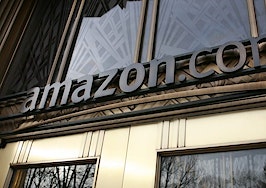At Inman Connect New York, Compass COO Maëlle Gavet told the audience that she believes “what Amazon has done to retail, someone is going to do to real estate.”
Is it possible that Amazon itself could be that someone, starting with mortgages?
Last week the news broke that Amazon is talking to big banks about potentially offering its customers simple banking services such as checking accounts, according to a report by the Wall Street Journal. Soon after, HousingWire reported that the online shopping platform is rumored to be looking into mortgage lending, going so far as to reportedly looking to hire a head for its new lending division.
“Amazon is in talks with JP Morgan to start providing checking account services,” Brent Nyitray, director of capital markets at iServe Residential Lending, told HousingWire in an email. “Amazon mortgages cannot be far behind.”
In the U.S., mortgage lending is an enormous industry — total mortgage debt topped $9.33 trillion in the last quarter of 2017. As the Great Recession of 2008-2009 made banks more hesitant to issue mortgages, non-bank lenders such as Quicken Loans and loanDepot were able to gain significant territory with middle-class homebuyers, Rick Sharga, executive vice president at Carrington Mortgage Holdings, told Inman.
“You could make a fairly good argument that there’s an opportunity for somebody like Amazon,” Sharga said, adding that millennials, in particular, are less likely to stay committed to a particular bank.
Since the Great Recession, the mortgage industry has been a fractured market — according to Sharga, not even the biggest lenders hold a majority share.
But while that fragmentation could give Amazon the opportunity to both expand its relationships with existing customers and reach those who have been refused by traditional banks, it’s also a significant venture from the company’s transactional business model — one in which Amazon serves as a marketplace between independent vendors and buyers.
“Could they easily migrate into this kind of heavily-regulated, government-operated, highly-scrutinized, hands-on transaction?” Sharga said. “It’s a big departure from their business model.”
Unlike online retailers, mortgage lenders have to navigate heavier government regulations and, in some cases, laws that vary from state to state. As a result, Sharga first sees Amazon acting as a marketplace in which lenders and real estate agents can offer their services and potentially moving into direct lending itself down the road.
But as Amazon’s acquisition of Whole Foods last year has shown, the company is known for its tendency to surprise customers. Only time will tell whether it will move forward with the mortgage lending leap.
“They are well positioned to be a player in pretty much any industry they choose to move into because their brand is so strong and they already have an existing business relationship with millions and millions of consumers,” Sharga said.
A similar sentiment was echoed by Quicken Loans’ Associate Counsel Jeremy Potter in an interview with Mortgage News Daily:
“Often big tech brands like Amazon and others want all the benefits of being inside a consumer’s wallet without the infrastructure and regulatory burden. For now, the back end and compliance are expensive (and complex) enough to ensure banks remain in control of [the] market. How long will that last? My hunch is the next generation is not concerned with traditional institutions or ‘supposed to’s.’ Brands like Amazon and even Starbucks have the loyalty, at least for now, but I guess we’re about to see how real that really is.”
An Amazon representative did not respond to Inman’s questions in time for publication.













